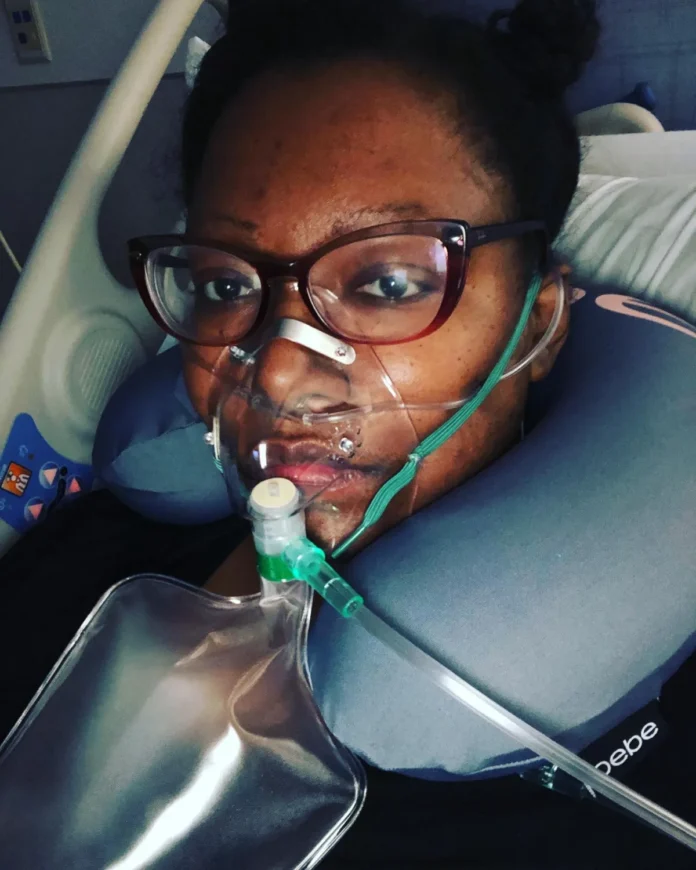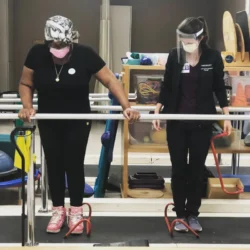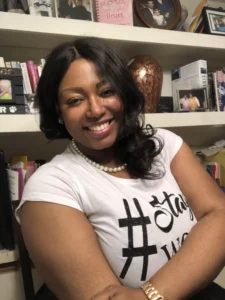
By Anissa Durham, Word In Black
This story (originally published on Word In Black) is part one of a series on long COVID that highlights the experiences of Black survivors of this virus who now advocate for equitable medical care and help fellow long COVID-19 survivors.
Heather-Elizabeth Brown tested negative for COVID-19 multiple times in early April 2020, but she knew something was wrong. The hospital in her hometown of Detroit, Michigan kept telling the now 38-year-old to drink fluids and take a prescription for hydroxychloroquine, and only come back if she was having breathing problems.
“At one point, I went home, and I told my mom I was afraid to go to sleep because I felt like I was not going to wake up,” she says.
When she returned to the hospital, for the third time, with a 103-degree fever and pain in her lungs, doctors admitted her for being positive for COVID-19.
Hours later, on April 18, she was put in a medically induced coma.
One she wouldn’t wake up from for 31 days.
While in a coma, she developed blood clots, had a stroke, received two blood transfusions, and had bleeding complications.
“When I woke up, I couldn’t walk, I couldn’t talk, I had a feeding tube, I was in the ICU for almost two weeks,” she says. “I had to relearn how to walk. I was in inpatient rehab for about six weeks. I had all sorts of therapy … pretty much everything that you can think of.”

Brown’s whirlwind of a COVID-19 diagnosis still affects her two and a half years later. Now, she is dealing with the aftermath of the virus ravaging her body and long COVID symptoms that impact her daily living.
According to the Henry J. Kaiser Family Foundation, in the U.S. Black communities are more than twice as likely as white people to be hospitalized for COVID-19 and almost twice as likely to die from the disease. Black folks like Brown are at a higher risk for developing long COVID symptoms that can last weeks or months after initial infection, Amira Johnson, a psychotherapist at Berman Psychotherapy said in an email.
The Centers for Disease Control and Prevention reported in a recent Household Pulse Survey that nearly one in five American adults who have had COVID-19, still have symptoms of long COVID — which is defined as lasting three or more months. Symptoms can include anything from but are not limited to cough, fatigue, heart palpitations, headache, sleep problems, stomach pain, and changes in menstrual cycles.
According to APM Research Lab, there were 16,418 deaths of Black folks in April 2020, the highest number of Black deaths in a single month since the start of the pandemic.
Trauma of Recovery
Waking up from the coma was only the start of Brown’s recovery. She says one of the major long COVID problems she developed was COVID-induced diabetes. She ended up back in the hospital a couple of months after her initial release and discovered her blood sugar was “so high that it was off the charts.”
Her list of long COVID symptoms doesn’t stop there — Brown struggled with swelling and lymphedema, hair loss, a disruption in her menstrual cycle, and brain fog. She says over the course of the last two and a half years some symptoms have gone, while others stayed.
“I do wonder if I had gotten a different level of care earlier if that would have resulted in not ending up on a ventilator and not ending up in a coma, which was obviously an incredibly traumatic experience,” she says.
But Brown says she understands at the beginning of the pandemic, there was a wave of misinformation and a lack of information. On top of that, people were dying so quickly, that hospitals were overwhelmed, running out of body bags, and bodies were being stacked on top of each other or put outside.
During the month of April 2020, nearly 60,000 people died of COVID-19 in the U.S., with one week that month surpassing 17,000 deaths, according to the CDC.
A few weeks before nearly losing her life, Brown, who works as a corporate trainer, started a new job. Luckily, she says her employer held her job for her while she recovered but she recognizes this isn’t the experience other Black folks in her position were afforded.

“I was out for almost six months between being ill and being in the hospital and then recovering and getting back to being able to do some semblance of work,” she says. “I was just incredibly blessed with that situation.”
As a trainer, her job is to talk all day, but that became increasingly difficult when her long COVID symptoms made it difficult for her to breathe. Brain fog also impacted her ability to remember what she wanted to say during a training session, or when preaching as an ordained minister.
Due to the severity of her brain fog, Brown filled her computer screens and desks with sticky notes to help her remember things. She says, “I had sticky notes all over the walls, I had pink ones, blue ones, green ones — and they were color coded.”
With recovery being a moving target, Brown says she regularly gets B-12 shots, takes supplements, has done oxygen therapy, and takes a nap every day because of the fatigue she experiences.
“I just want to re-message the importance of being an advocate for yourself,” Brown says, especially “when it comes to your health and getting care and not being a shrinking violet when it comes to speaking to medical professionals about your health, your body, and your wellness.”
HEATHER-ELIZABETH BROWN, CORPORATE TRAINER.
Medical Bias
Additionally, Brown says an important part of her recovery was being up to date with her medical records — everything from her hospitalization to her post-hospital doctor visits. But when reading one of her charts a month after being extubated from the ventilator and returning to the hospital for issues with blood clots, she discovered something surprising.
“There was a note that a nurse had written that said something to the effect of patient ‘claims’ … ‘to be a COVID survivor and has longer lasting COVID symptoms,’” she recalls. “And then something else that pretty much said to the effect of ‘is searching for medication’ or something that kind of indicated to other providers like, don’t take this person seriously.”
“I’ve been diagnosed with PTSD, I have an emotional support animal,” she says.
HEATHER-ELIZABETH BROWN, CORPORATE TRAINER.
In Michigan, where Brown lives, thousands of ICU beds were filled with confirmed and suspected COVID-19 patients between July 15 and Dec. 31, 2020.
With cases of misdiagnosis and mistreatment, even the best studies may underestimate the impacts of long COVID, Johnson explained via email. Having negative experiences in a medical setting — like medical mistreatment — could make folks not want to reach out to professionals for help.
“This then leads to them being permanently affected by these conditions or dying because of them,” Johnson said.
“I was so hurt and completely offended that was in my record and someone had written that especially given that if she would have just looked back in my chart like a month, she would have seen that I had a severe COVID infection and I was intubated and in a coma in that same hospital like 30 days earlier,” Brown says. “I’ve had this experience that’s documented and there’s still somebody who’s discounting my experience and my complaints and my pain.”
That experience, she says, has played out with so many people of color in hospitals and doctors’ offices — if you don’t have a medical provider that understands long COVID or even believes you that’s when things can get dangerous.
“I’ve been diagnosed with PTSD, I have an emotional support animal,” she says.
Johnson said it’s no surprise those with long COVID are not only struggling physically but mentally. When inflammation or viral infections affect other organs, she said it makes sense that they would also affect the brain, causing psychological symptoms. Depression, anxiety, and other mental illnesses have been associated with a greater risk of COVID-19 infection, including the risk of hospitalization, which is a risk factor for long COVID.
“Things like psychotherapy, or cognitive behavioral therapy can help treat these mental health conditions that may arise, but it’s a gradual process,” she says.
Advocacy saved her life, but what about others?
Brown says having a strong support system, close friends who are doctors, church family, and a community of people praying for her is how she was able to navigate her near-death experience.
“I recognize that I am the exception to the rule,” she says.
The Black community was hit hardest during the pandemic for loss of employment, illness, death, and food insecurity — with the community recovering the slowest when it comes to employment. According to a Dec. 2020 report by the National Library of Medicine, nearly 40% of African American workers had low-wage jobs in 2018, which gave folks a greater risk of COVID-19 exposure.
“People of color specifically had a more difficult time getting tested, getting treated for care, and getting treated earlier. I know that was my biggest issue,” Brown says. “The reason I think I had a more severe experience is because by the time they caught it, and by the time I started getting treatment, it had already progressed to a pretty severe place.”

Because of Brown’s outspoken nature, she says she constantly advocated for herself and had family and friends in the medical field who were able to advocate for her as well. Sometimes in medical settings, it can be easy to become intimidated by people who have knowledge about your body, she says — but nobody knows your body best.
After being turned away from the hospital multiple times, it could have been easy for Brown to stay home, but if she had not insisted on going back to the hospital and not leaving until she got care, she says she may not be alive to tell her story today.
“I just want to re-message the importance of being an advocate for yourself,” Brown says, especially “when it comes to your health and getting care and not being a shrinking violet when it comes to speaking to medical professionals about your health, your body, and your wellness.”


